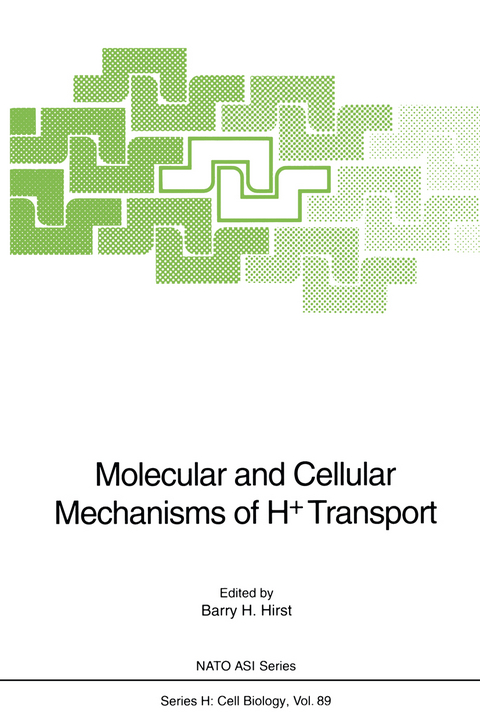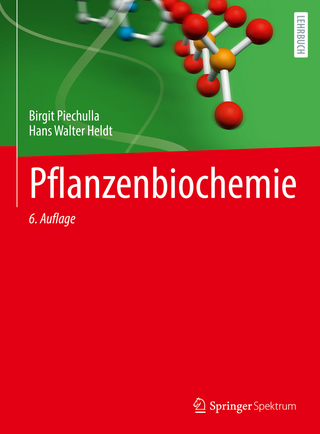
Molecular and Cellular Mechanisms of H+ Transport
Springer Berlin (Verlag)
978-3-642-79303-5 (ISBN)
Reviewed here is the current knowledge of proton transport mechanisms in mammals. The emphasis is on gastric acid secretion and the role of the H+, K+-ATPase, but molecular and cellular information on other P-, V- and F-type H+-ATPases, in bone, kidney, plants and yeast, as well as other cation ATPases, are included for important comparisons. The role of proton/anion antiports, symports and channels in proton transport is discussed. Further attention is given to the regulation of proton transport mechanisms and cellular mechanisms to resist damage from highly acidic environments.
Gastric H+,K+-ATPase.- Gene Structure and Regulation of Gastric Proton Pump.- The Gastric H/K ATPase ß Subunit Gene and Transcriptional Pathways in Acid-Secreting Epithelia of the Stomach and Kidney.- Functional Expression of Gastric H,K-ATPase in Sf9 Cells Using the Baeulovirus Expression System.- Structural and Functional Integrity of H,K-ATPase Depends on Its ß-Subunit.- The Topology of the ?, ß Subunits of the Gastric H/K ATPase.- Synthetic Peptide Antibody Probes of Membrane Orientation of the Gastric H,K-ATPase.- Molecular Determinants of Subunit Assembly and Processing in Na,K-ATPase and H,K-ATPase.- Assembly of Hybrid Pumps from Na,K-ATPase ? Subunits and the H,K-ATPase ß Subunit.- DCCD Inhibition of Cation Binding in the Gastric H,K-ATPase.- Mapping of a Cytoplasmic Site of Gastric (H+,K+)-ATPase Involved in the Transmission of K+-Activation Across the Membrane.- New Approaches to Inhibition of Gastric Acid Secretion: Development and Mechanism of Omeprazole.- K+-Competitive Inhibitors of the Gastric (H + + K+)-ATPase.- Bioactive Peptide Inhibitors and an Endogenous Parietal Cell Protein: Interactions with the Gastric H+/K+ ATPase.- The Gastric H/K-ATPase: The Principle Target in Autoimmune Gastritis.- Non-gastric transport-ATPases.- Acidic and Non-Acidic Endosomes in Kidney Epithelial Cells: Their Role in Cell-Specific Membrane Recycling Processes.- Regulation and Properties of the Coated Vesicle Proton Pump.- Characterization of the Osteoclast Vacuolar H+ ATPase: Biochemistry, Subunit Composition and Cloning of Catalytic Subunits.- The Renal H-K-ATPase: Function and Expression.- Apical K+-ATPase and Active Potassium Absorption in the Distal Colon.- Amino Acid Residues Involved in Ouabain Sensitivity and Cation Binding.- The Use of Site-DirectedMutagenesis to Identify Functional Sites in the Ca2+ ATPase.- Structure-Function Relationships in Transmembrane Segment IV of the Yeast Plasma Membrane [H+]-ATPase.- The Role of Two Small Proteolipids Associated to the H+-ATPase from Yeast Plasma Membrane.- Ion Translocation Stoichiometries of Two Endomembrane H+-Pumps Studied by Patch Clamp.- Molecular Dissection of Vacuolar H+-Pyrophosphatase.- F-type H+-ATPase: Catalysis and Proton Transport.- Contribution of Infrared Spectroscopy to the Understanding of the Structure of the Neurospora crassa Plasma Membrane H+-ATPase.- Partial Reaction Chemistry and Charge Displacement by the Fungal Plasma-Membrane H+-ATPase.- Proton/anion antiports, symports and channels.- Molecular Properties, Kinetics and Regulation of Mammalian Na+/H+ Exchange.- Polarized Na/H Exchangers in Colonic Epithelium: A Problem of Balance.- The AE Gene Family of Band 3-Related Anion Exchangers.- Proton-Coupled Peptide Transport in the Small Intestine and Kidney.- H+-Coupled Solute Transport in Cultured Intestinal Epithelia.- Measurement of H+ and Ca2+ Extrusion from Single Isolated Cells.- CFTR Chloride Channels and Pancreatic Ductal Bicarbonate Secretion.- Acute Regulation of Na+:HCO3- Cotransport System in Kidney Proximal Tubules.- Potassium Dependent H+/HCO3- Transport Mechanisms in Cells of Medullary Thick Ascending Limb of Rat Kidney.- Regulation of proton and HCO3- transport.- Characterization of Parietal Cell Functional Morphology Utilizing Isolated Gastric Gland Perfusion, Atomic Force and Confocal Microscopy.- Activation of Calpain in Gastric Parietal Cells.- Stimulation of Gastric Acid Secretion Causes Actin Filament Formation and Development of the Secretory Surface in Frog Oxynticopeptic Cells.- Expression of Rat Gastric H+,K+-ATPase in Insect Cells Using a Double Recombinant Baculovirus.- Influence of F-Actin on Na+/K+/2CI- Cotransport in Cultured Intestinal Epithelia.- Ca2+ Pools and H+ Secretion by the Parietal Cell.- Acidophylie Cl- and K+ Channels of the Gastric Parietal Cell: A New Model of Regulated HCl Secretion.- Uncoupling of H+ and Pepsinogen Secretion in the Amphibian Oxyntopeptic Cell.- The Canine Gastric Muscularis Mucosae and Acid Secretion: A Basket Case?.- The Receptors Regulating Acid Secretion On and Off the Parietal Cell.- Post-Receptor Signaling Mechanisms in the Gastric Parietal Cell.- Cellular resistance to acid.- Relative Sensitivity to Acid Injury of Different Regions of the Intestinal Tract.- "First-Pass" Protection Against Luminal Acid in Necturus Antral Epithelium.- Regulation of pHi in Oxyntic Cells in Intact Sheets of Frog Gastric Mucosa.- Oxyntic cell Na+/H+ and CI-/HCO3- exchangers.- Duodenal Mucosal Bicarbonate Secretion in Humans.- Gastric Bicarbonate Secretion.- Role of Dopamine in Control of Duodenal Mucosal Bicarbonate Secretion.- Author Index.
| Erscheint lt. Verlag | 22.11.2011 |
|---|---|
| Reihe/Serie | Nato ASI Subseries H: |
| Zusatzinfo | X, 494 p. |
| Verlagsort | Berlin |
| Sprache | englisch |
| Maße | 155 x 235 mm |
| Gewicht | 773 g |
| Themenwelt | Naturwissenschaften ► Biologie ► Biochemie |
| Naturwissenschaften ► Biologie ► Zellbiologie | |
| Schlagworte | Amino acid • ATP • ATPase • biochemistry • catalysis • cellular mechanisms • Chemistry • Colon • Gastroenterologie • gastroenterology • kidney • Membrane • MEMBRANE TRANSPORT • Membrantransport • Protein • proteins • Protonentransport • Proton transport • receptor • Regulation • transcription • Transportproteine • transport proteins |
| ISBN-10 | 3-642-79303-7 / 3642793037 |
| ISBN-13 | 978-3-642-79303-5 / 9783642793035 |
| Zustand | Neuware |
| Haben Sie eine Frage zum Produkt? |
aus dem Bereich


